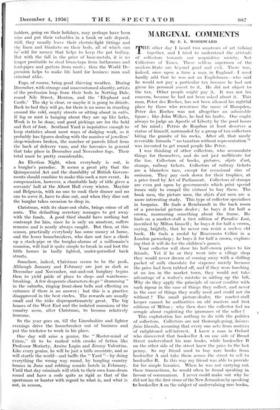MARGINAL COMMENTS
By E. L. WOODWARD
figure ; like John Wilkes, he had his faults. One ought always to judge an Apostle of Liberty by the good hours of his mind ; Petrus de Rupibus at least deserves a statue of himself, surrounded by a group of tax-collectors biting the granite of his rocks. After all, that nicely reversible formula " no taxation without representation " was invented to get round people like Peter.
I was thinking of other collectors, who accumulate things for themselves, and do not just mellificate for the Ilse. Collectors of books, pictures, objets d'art, stamps, railway tickets. Collectors of railway tickets are a blameless race, except for occasional sins of omission. They pay cash down for their trophies, at a price fixed by Act of Parliament. Collectors of stamps are even put upon by governments which print special issues only to compel the virtuosi to buy them. The book men, the picture men, the objets d'art men are a more interesting study. This type of collector specialises in bargains. He finds a Rembrandt in the back room of a provincial picture dealer ; he buys it for half a crown, murmuring something about the frame. He finds on a market-stall a first edition of Paradise Lost, inscribed by Milton himself ; he buys it for half a crown, saying, brightly, that he never can resist a useless old book. He finds a medal by Benvenuto Cellini in a London pawnshop ; he buys it for half a crown, explain- ing that it will do for the children's games.
Your collector will show his half-crown prizes to his friends. Yet if he or they went into a village shop they would never dream of coming away with a shilling packet of milk chocolate for sixpence merely because the price had been rubbed off, and if they were lunching at an inn in the market town, they would not take advantage of a waiter's mistake in adding up the bill. Why do they apply the principle of caveat venditor with such rigour in the case of things they collect, and never in the case of things they really need and could not do without ? The small picture-dealer, the market-stall keeper cannot be authorities on old masters and first editions of Milton ; why then does the collector feel no scruple about exploiting the ignorance of the seller ?
This exploitation has nothing to do with the politics of collectors. Collectors are not thorough-going, laisser- faire liberals, assuming that every one acts from motives of enlightened self-interest. I knew a man in Oxford who discovered that bookseller A on one side of Broad Street undervalued his rare books, while bookseller B on the other side of the street knew the price to the last penny. So my friend used to buy rare books from bookseller A and take them across the street to sell to bookseller B. In this way my friend was able to provide for his simple luxuries. When he was not carrying -out these .transactions, he would often be found speaking in favour of communism. I never could make out why he did not lay the first stone of the New Jerusalem by speaking to bookseller A on the subject of undervaluing rare books.




















































 Previous page
Previous page